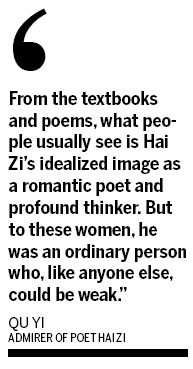
 'Taken 2' grabs movie box office crown
'Taken 2' grabs movie box office crown
 Rihanna's 'Diamonds' tops UK pop chart
Rihanna's 'Diamonds' tops UK pop chart
 Fans get look at vintage Rolling Stones
Fans get look at vintage Rolling Stones
 Celebrities attend Power of Women event
Celebrities attend Power of Women event
 Ang Lee breaks 'every rule' to make unlikely new Life of Pi film
Ang Lee breaks 'every rule' to make unlikely new Life of Pi film
 Rihanna almost thrown out of nightclub
Rihanna almost thrown out of nightclub
 'Dark Knight' wins weekend box office
'Dark Knight' wins weekend box office
 'Total Recall' stars gather in Beverly Hills
'Total Recall' stars gather in Beverly Hills
Poetry put in motion
Updated: 2012-03-23 13:49
By Han Bingbin (China Daily)
|
||||||||
 |
|
Wang Weicheng plays the leading role of Hai Zi. Provided to China Daily |
Poet Hai Zi lay down on a railway track and ended his life at age 25, becoming "the symbol of an era of poetry". Hai Zi's legacy, following his premature death on March 26, 1989, in Shanhaiguan, Hebei province, was more than 2 million characters of poetry.
Of those admirers left behind is young poet Qu Yi, who reasons that Hai Zi's suicide had a simple motivation: "It was love."
Directly, she says, he killed himself because he was upset about relationships, though they inspired more than 200 love poems.
Hai Zi had tangled affairs with four women in his short life. Three were the poet's loyal admirers, and their relationships with the poet all ended with his refusal to marry.
The other was a female poet in Tibet known as Li Hua, whom Qu says Hai Zi adored for the longest time, though he was rejected by her on a visit to the autonomous region.
After he returned to Beijing, he hid himself away, ignored his teaching job and wrote poems day and night.
Several days before his death, Qu says, Hai Zi met his first lover (not Li Hua) at a luncheon. He confessed to friends he said something harmful to the girl in a drunken rage and soon after bought a ticket to Shanhaiguan, where the Great Wall begins.
"From the textbooks and poems, what people usually see is Hai Zi's idealized image as a romantic poet and profound thinker," Qu says. "But to these women, he was an ordinary person who, like anyone else, could be weak."
By dramatizing Hai Zi's story, Qu, also a director, has created her annual tribute to the poet.
In 2011, she presented a one-act play narrating Hai Zi's life, but she found words alone could not fully express his life and works.

So, Qu presented an acclaimed cross-genre show as part of the Year of Chinese Culture (2011) in Italy. Named after Hai Zi's famous poem Asian Bronze, the show was based on 35 poems by 19 established Chinese contemporary poets - and the spirit of the poems was embodied and visualized in modern dance and music, rather than spoken.
That same artistic method has been applied to this year's show, Entering A Place that's Deeper than Love.
In addition to the lead actor in the role of Hai Zi, a dancer visualizes the feelings of the verses, accompanied by electronic music and light rock Qu composed.
While some critics say this approach is too experimental, Qu claims it is traditional.
"Poetry is originally a comprehensive art form. It's written on paper, but is surely not just for people to read. Since the Tang Dynasty (618-907), China has sustained a tradition of reciting as well as singing, even dancing, to poems," she says.
Qu studied music from a young age. Music is not just an artistic tool to help audiences better understand the play. It also helps Wang Weicheng, the lead actor, understand the poet's inner world, she says.
The senior student at the Central Academy of Drama was chosen because of his temperament, which is similar to the poet.
To help him fully understand the depths of Hai Zi's prose, Qu asked Wang to repeatedly read the poems during rehearsal while she played piano.
As the piano played louder, Wang tailed off, so Qu turned to rock music.
That's when Wang excitedly responded: "Director! I think I'm almost there and you've got to let me listen to it before I go onstage!"
When asked if she doubts Wang can capture the poet's character and poetry, Qu responds: "It's surely a challenge. But, frankly, I don't worry about audience's reaction. If I did, I wouldn't be doing this."
hanbingbin@chinadaily.com.cn
Most Viewed
Editor's Picks

|

|

|

|

|

|
Today's Top News
Health new priority for quake zone
Xi meets US top military officer
Japan's boats driven out of Diaoyu
China mulls online shopping legislation
Bird flu death toll rises to 22
Putin appoints new ambassador to China
Japanese ships blocked from Diaoyu Islands
Inspired by Guan, more Chinese pick up golf
US Weekly

|

|






